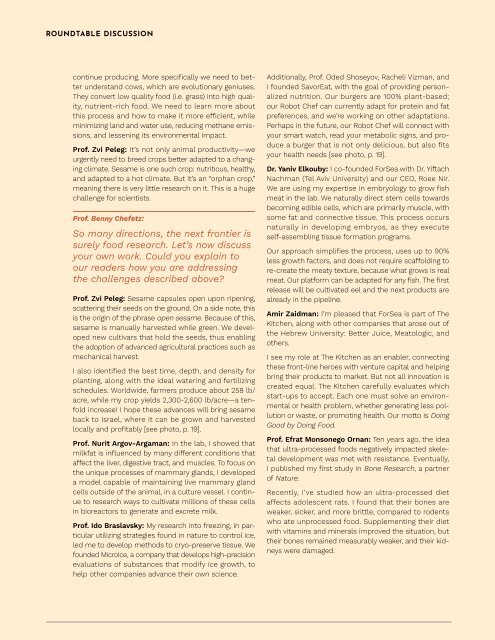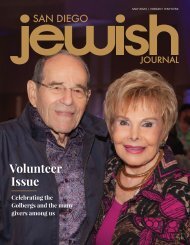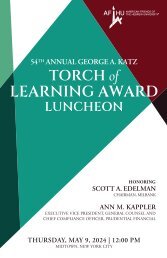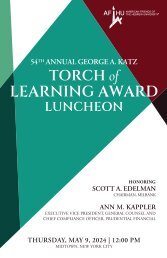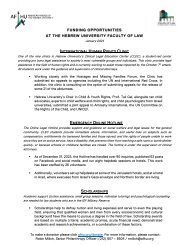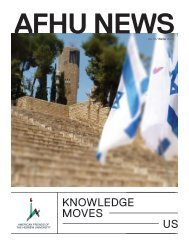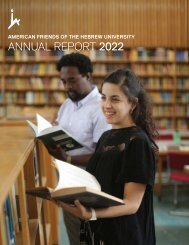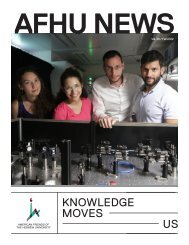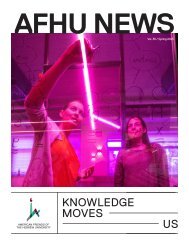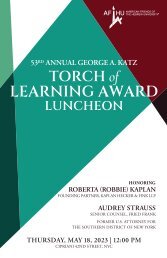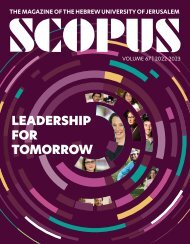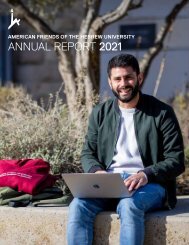Scopus Magazine 2023
Create successful ePaper yourself
Turn your PDF publications into a flip-book with our unique Google optimized e-Paper software.
Roundtable Discussion<br />
continue producing. More specifically we need to better<br />
understand cows, which are evolutionary geniuses.<br />
They convert low quality food (i.e. grass) into high quality,<br />
nutrient-rich food. We need to learn more about<br />
this process and how to make it more efficient, while<br />
minimizing land and water use, reducing methane emissions,<br />
and lessening its environmental impact.<br />
Prof. Zvi Peleg: It’s not only animal productivity—we<br />
urgently need to breed crops better adapted to a changing<br />
climate. Sesame is one such crop: nutritious, healthy,<br />
and adapted to a hot climate. But it’s an “orphan crop,”<br />
meaning there is very little research on it. This is a huge<br />
challenge for scientists.<br />
Prof. Benny Chefetz:<br />
So many directions, the next frontier is<br />
surely food research. Let’s now discuss<br />
your own work. Could you explain to<br />
our readers how you are addressing<br />
the challenges described above?<br />
Prof. Zvi Peleg: Sesame capsules open upon ripening,<br />
scattering their seeds on the ground. On a side note, this<br />
is the origin of the phrase open sesame. Because of this,<br />
sesame is manually harvested while green. We developed<br />
new cultivars that hold the seeds, thus enabling<br />
the adoption of advanced agricultural practices such as<br />
mechanical harvest.<br />
I also identified the best time, depth, and density for<br />
planting, along with the ideal watering and fertilizing<br />
schedules. Worldwide, farmers produce about 258 lb/<br />
acre, while my crop yields 2,300-2,600 lb/acre—a tenfold<br />
increase! I hope these advances will bring sesame<br />
back to Israel, where it can be grown and harvested<br />
locally and profitably [see photo, p. 19].<br />
Prof. Nurit Argov-Argaman: In the lab, I showed that<br />
milkfat is influenced by many different conditions that<br />
affect the liver, digestive tract, and muscles. To focus on<br />
the unique processes of mammary glands, I developed<br />
a model capable of maintaining live mammary gland<br />
cells outside of the animal, in a culture vessel. I continue<br />
to research ways to cultivate millions of these cells<br />
in bioreactors to generate and excrete milk.<br />
Prof. Ido Braslavsky: My research into freezing, in particular<br />
utilizing strategies found in nature to control ice,<br />
led me to develop methods to cryo-preserve tissue. We<br />
founded MicroIce, a company that develops high-precision<br />
evaluations of substances that modify ice growth, to<br />
help other companies advance their own science.<br />
Additionally, Prof. Oded Shoseyov, Racheli Vizman, and<br />
I founded SavorEat, with the goal of providing personalized<br />
nutrition. Our burgers are 100% plant-based;<br />
our Robot Chef can currently adapt for protein and fat<br />
preferences, and we’re working on other adaptations.<br />
Perhaps in the future, our Robot Chef will connect with<br />
your smart watch, read your metabolic signs, and produce<br />
a burger that is not only delicious, but also fits<br />
your health needs [see photo, p. 19].<br />
Dr. Yaniv Elkouby: I co-founded ForSea with Dr. Yiftach<br />
Nachman (Tel Aviv University) and our CEO, Roee Nir.<br />
We are using my expertise in embryology to grow fish<br />
meat in the lab. We naturally direct stem cells towards<br />
becoming edible cells, which are primarily muscle, with<br />
some fat and connective tissue. This process occurs<br />
naturally in developing embryos, as they execute<br />
self-assembling tissue formation programs.<br />
Our approach simplifies the process, uses up to 90%<br />
less growth factors, and does not require scaffolding to<br />
re-create the meaty texture, because what grows is real<br />
meat. Our platform can be adapted for any fish. The first<br />
release will be cultivated eel and the next products are<br />
already in the pipeline.<br />
Amir Zaidman: I’m pleased that ForSea is part of The<br />
Kitchen, along with other companies that arose out of<br />
the Hebrew University: Better Juice, Meatologic, and<br />
others.<br />
I see my role at The Kitchen as an enabler, connecting<br />
these front-line heroes with venture capital and helping<br />
bring their products to market. But not all innovation is<br />
created equal. The Kitchen carefully evaluates which<br />
start-ups to accept. Each one must solve an environmental<br />
or health problem, whether generating less pollution<br />
or waste, or promoting health. Our motto is Doing<br />
Good by Doing Food.<br />
Prof. Efrat Monsonego Ornan: Ten years ago, the idea<br />
that ultra-processed foods negatively impacted skeletal<br />
development was met with resistance. Eventually,<br />
I published my first study in Bone Research, a partner<br />
of Nature.<br />
Recently, I’ve studied how an ultra-processed diet<br />
affects adolescent rats. I found that their bones are<br />
weaker, sicker, and more brittle, compared to rodents<br />
who ate unprocessed food. Supplementing their diet<br />
with vitamins and minerals improved the situation, but<br />
their bones remained measurably weaker, and their kidneys<br />
were damaged.


